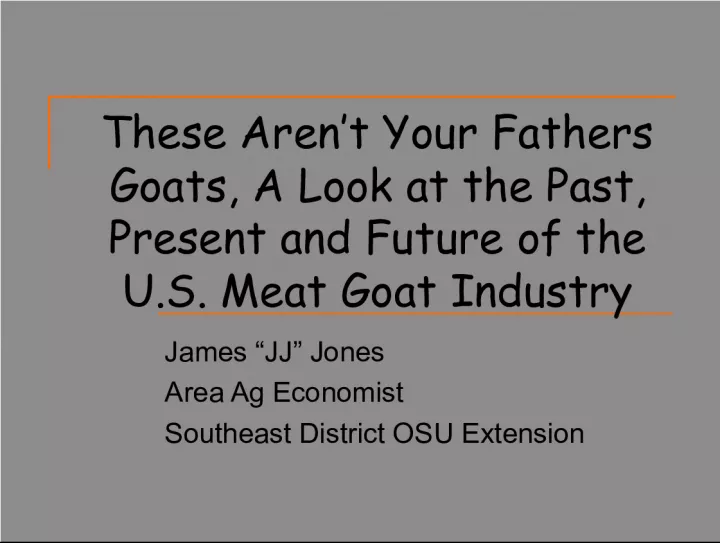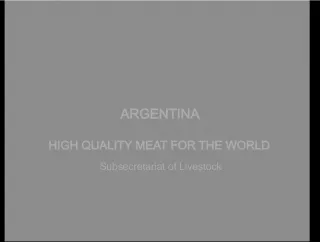The Evolution of U.S. Meat Goat Industry: Past, Present, and Future


This article explores the history of the U.S. meat goat industry before and after the 1990s, the impact of government programs, and the emergence of distinct meat goat breeds. It also looks at the present state of the industry and its future potential.
- Uploaded on | 4 Views
-
 alexia
alexia
About The Evolution of U.S. Meat Goat Industry: Past, Present, and Future
PowerPoint presentation about 'The Evolution of U.S. Meat Goat Industry: Past, Present, and Future'. This presentation describes the topic on This article explores the history of the U.S. meat goat industry before and after the 1990s, the impact of government programs, and the emergence of distinct meat goat breeds. It also looks at the present state of the industry and its future potential.. The key topics included in this slideshow are meat goat industry, history, Boer goats, USDA, distinct breeds,. Download this presentation absolutely free.
Presentation Transcript
1. These Arent Your Fathers Goats, A Look at the Past, Present and Future of the U.S. Meat Goat Industry James JJ Jones Area Ag Economist Southeast District OSU Extension
2. Goat Industry before 1990 Dairy Cheese Mohair Government program cut from farm bill Brush
3. Goat Industry after 1990s Started importing African meat goats in mid 90s Started with Boer goats Now are there are 3-5 distinct meat goat breeds in the U.S. USDA started counting meat goats in 2004
4. Why the increase? Goat meat is consumed by: Muslims Hispanic Europeans Asians Africans Seems to be limited by supply Future demand?
5. Industry Overview 2006 Demand Mil. Lbs Slaughtered (official) 20.4 Imported 24.5 Slaughtered (unofficial) 3.5 48.4
6. < 10,000 1 2 3 4 5 6 9 7 8 10,000 - 30,000 75,000 - 100,000 50,000 - 75,000 30,000 - 50,000 > 1,000,000 100,000 - 1,000,000 2007 U.S. Meat Goat Numbers Source: NASS U.S. Total: 2,400,000
7. Southern Region Goat Numbers Texas (1) 1,080,000 Tennessee (2) 103,000 Georgia (3) 95,000 Oklahoma (5) 74,000 Kentucky (7) 68,000 North Carolina (8) 60,000 Florida (9) 55,000 South Carolina (10) 44,000 Alabama (11) 43,000 Virginia (12) 41,000 Arkansas (14) 29,000 Mississippi (18) 24,000 Louisiana (27) 12,800 Total 1,728,800 76.5% of U.S. Total or 72% of the U.S. goats
8. 2005 U.S. Inspected Slaughter 1. New Jersey 209,156 37% 2. Texas 38,079 6.7% 3. Pennsylvania 37,041 6.6% 4. New York 33,459 5.9% 5. Tennessee 29,692 5.2% 6. DE/MD 25,682 4.5% 7. Illinois 25,660 4.5% 9. California 22,214 3.9% 8. Indiana 22,899 4% 10. Florida 15,610 2.7% U.S. Total: 566,208 head
9. Types of Goat Operations 1. Brush Control Used as weed eaters Profit is not the motive 3. Purebred or Seed Stock Higher start up costs Build a reputation Breed association Registration of animals 2. Multi-Species Grazing Compliments other livestock enterprise Profit can be a motive 4. Commercial Goat Operation Produce kids for meat production Manage for profit maximization
10. Holiday Demand Holiday Date Type of goat Easter (Western) April 8, 2007 March 23, 2008 April 12, 2009 20 to 50 pounds Easter (Eastern and Greek) April 8, 2007 April 27, 2008 April 19, 2009 20 to 50 pounds Independence Day July 4 20 to 35 pounds Caribbean holidays August 60 pound bucks
11. Holiday Demand Holiday Date Type of goat Start of Ramadan (Muslim) September 13, 2007 September 8, 2008 August 22, 2009 45 to 120 pounds less than 12 months Eid al Fitr (Muslim) October 13, 2007 October 2, 2008 September 21, 2009 45 to 120 pounds 60 pounds optimum Eid al Adha (Muslim) December 20, 2007 December 8, 2008 November 28, 2009 Yearlings, blemish free Dassai (Hindu) October 12, 2007 September 30, 2008 Male goats only, size depends upon number being fed
12. Why are goats popular? Perfect for a small producer with limited: Land Capital (although can be higher than first thought) Equipment Can be profitable OSU budget shows a return of $35/head Show goats Around 1800 kids with goat projects
13. Goat Industry Challenges Production diversity and multiple products Demand diversity Demand future Will future generations continue to eat goat? Geographic dispersion of production and consumption Seasonality of supply and demand Fragmented and limited market infrastructure Lack of market information Lack of research on goat production
14. What about the future? Goat numbers continue to increase. Theoretically could increase goat herd by 500,000. Show goat projects continue to increase. Currently have not reached saturation point. It is not the ostrich market all over again. It is not your dads goat farm. As long as there is a demand for the final product there will be a viable market.
15. Questions?























